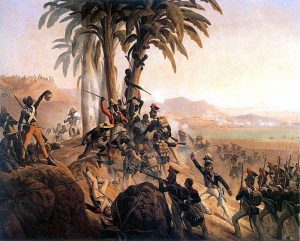The Mirabal sisters, three resilient and determined women, sought not only to serve as advocates for women’s rights, but ultimately to act as heroines for their country. Patria, Minerva, and María Teresa Mirabal lived with their family in Ojo de Agua in Salcedo Province, Dominican Republic. Their parents were successful land and business owners, and the girls lived a very conservative and humble life.1 The girls were taught the importance of education by both of their parents who worked hard to send the girls to the Colegio Inmaculada Concepcion in La Vega, a Catholic Boarding School.2

The sisters grew up during a time of intense turmoil in their country. In 1930, the Dominican Republic was placed under the rule of Generalissimo Rafael Leonidas Trujillo Molina.3 Trujillo served as the dictator of the Dominican Republic for nearly three decades, and his rule “established the most totalitarian control over his people that any Latin American country had theretofore experienced.”4 His rule included instances of bribery, murder, the disappearances of anything or anyone who challenged him, sexual advances towards a number of unwilling women, along with a number of other injustices.5

The Mirabal sisters, being the strong, intelligent, and outspoken women that they were, realized that they were unwilling to live under Trujillo’s corrupt and harmful regime. Their involvement and leadership in the revolution against Trujillo was unprecedented, not only because of the “essentially passive role [of women] in Hispanic societies,” but also due to the fear that a majority of Dominican citizens had of Trujillo.6 Still, though, three of the Mirabal sisters–Patria, Minerva, and María Teresa–along with their husbands, became symbols and leaders of political activism and opposition to Trujillo and his regime. Specifically, by 1960 the women and their husbands became synonymous with “the underground Movimiento Revolucionario 14 de Junio (MR14J) by the code name of Mariposa (butterfly)…[and] their activities to agents of Trujillo’s secret police, the dreaded SIM.”7
The sisters and their husbands were jailed multiple times for their involvement in the various protests and movements against Trujillo.8 Their movement in opposition to Trujillo came to a staggering halt on November 25, 1960. Patria, Minerva, and María Teresa were traveling back home from a jail in Puerto Plata, where their husbands were imprisoned, when they were attacked by Trujillo’s secret police. “The three women and their driver were taken out, strangled and clubbed to death. Then, in a feeble attempt to cover up the murders, their bodies were put back in the jeep and thrown off a cliff.”9 Word of the sisters’ death spread like wildfire throughout the Dominican Republic, especially among those who worked alongside Patria, Minerva, and María Teresa in opposition to Trujillo. Their deaths were described in “Trujillo’s puppet newspaper El Caribe…[as an] ‘automobile accident'”; however, “few people at home or abroad were fooled by the story,” and Trujillo’s attempt to cover up the murder was unsuccessful.10

The bravery of the women, their refusal to stay quiet or give up, and their unwavering organization efforts against Trujillo were all integral in the events that ultimately led to Trujillo’s downfall. The Mirabal sisters, now largely known as “the Mariposas,” have come to be recognized as heroines in the Dominican Republic. The country shows their appreciation and respect for the women in “virtually every Dominican [town]…[with] some commemorative marker, school, or main street bearing their names.”11 Furthermore, the women have become symbols of women and human rights worldwide. Every year, November 25, the anniversary of the sisters’ murder, is recognized as the International Day for the Elimination of Violence Against Women; November 25 is also “the beginning of 16 Days of Activism Against Gender Violence, which culminates on Human Rights Days on Dec. 10.”12
- Women in World History: A Biographical Encyclopedia, 2002, s.v. “Mirabal Sisters,” by John Haag, Ed. by Anne Commire. ↵
- Julia Alvarez, In the Time of the Butterflies (Chapel Hill, N.C.: Algonquin Books of Chapel Hill, 1994), 13. ↵
- Women in World History: A Biographical Encyclopedia, 2002, s.v. “Mirabal Sisters,” by John Haag. ↵
- Encyclopedia of Latin American History and Culture, 2008, s.v. “Trujillo Molina, Rafael Leónidas (1891-1961).” ↵
- Encyclopedia of Latin American History and Culture, 2008, s.v. “Trujillo Molina, Rafael Leónidas (1891-1961).” ↵
- Nancy Robinson, “Women’s Political Participation in the Dominican Republic: The Case of the Mirabal Sisters.” Caribbean Quarterly 52, no. 2 (January 6, 2006): 172. ↵
- Women in World History: A Biographical Encyclopedia, 2002, s.v. “Mirabal Sisters.” ↵
- Julia Alvarez, In the Time of the Butterflies (Chapel Hill, N.C.: Algonquin Books of Chapel Hill, 1994), 257-260, 337. ↵
- Nancy Robinson, “Women’s Political Participation in the Dominican Republic: The Case of the Mirabal Sisters,” Caribbean Quarterly 52, no. 2 (January 6, 2006): 172–73. ↵
- Women in World History: A Biographical Encyclopedia, 2002, s.v. “Mirabal Sisters.” ↵
- Nancy Robinson, “Women’s Political Participation in the Dominican Republic: The Case of the Mirabal Sisters,” Caribbean Quarterly 52, no. 2 (January 6, 2006): 173-74. ↵
- Charlotte Alter, “The Brutal Triple Murder Behind the International Day for the Elimination of Violence Against Women,” Time Magazine (December 2, 2014), 1. ↵



54 comments
Eric Ortega Rodriguez
It is astonishing to read about Patria, Minerva, and María Teresa Mirabal. They are true heroines, not only for the Dominican Republic but for women everywhere. They, along with their husbands, were willing to risk it all if it meant putting an end Trujillo’s corrupt and harmful regime. I find it sad that it ended with their death but because of that, people were more aware of what was going on even with Trujillo’s efforts to cover it up. I am happy to hear that November 25 is dedicated to them for their bravery and courage to stand up, even when it seemed that all odds were opposing them. A Very interesting article overall with a very good topic selection. Good work.
Luisa Ortiz
I never knew that the International Day for the Elimination of Violence Against Women was because of the “Mariposas sisters”I’m not surprised by their murder; it is sad but frequently that those who speak out the final silence. It is the only way to “silence their voice” but I’m so happy that the community knew and was able to continue and to commoner their tragic death.
Maria Mancha
I had never heard about the Mirabal sisters, it is such an inspiring story. Especially because usually we only discuss women rights in the United States and don’t really talk about women movements in other countries. Their death was extremely saddening and not really expected like that. I especially enjoyed that even though the sisters and their husbands were jailed multiple sides they still never gave up. It was very interesting that they kept as a family even through the tough times. The article was a great read and I learned something completely new and I enjoyed it.
lily
There is a movie starring Selma Hayak called ” In the time of the butterfies” all about the sisters. Catch it if you can.
Natalia Flores
This article, especially the end, strikes me. A lot of murders in Latin America are, unfortunately, covered up due to corruption and bribes. I’m glad that the mariposas story didn’t get glossed over and explained as an “automobile accident”. It’s terrifying, but at the same time inspiring since these women risked it all to defy a totalitarian regime. I didn’t know that the day to end violence against women was created in honor of them.
Belia Camarena
In high school, one of our assigned books was In the Time of the Butterflies, and it was a novel about the lives of the Mirabal sisters. I really enjoyed reading the book and this article because these sisters were truly amazing women. By standing up to Trujillo’s regime, they did what most others were to scared to do. They were incredibly brave, and their actions continue to be an inspiration.
Maria Esquivel
I have never heard of the Maribal sisters but I am glad that I read about them today. I think it’s important to learn about strong and inspiring women from all around the world who stood up to corrupt politicians and started a movement to have their voices heard, like the Maribal sisters. It’s horrible to read that they were killed and they didn’t accomplish everything they wanted because of Trujillo. Yet, I am glad to see that Patria, Minerva and Maria are being remembered for their heroism.
Ximena Mondragon
What these sisters did was amazing which is true bravery. We always hear about the women who fought here in the United States but we never hear of those people who fought in other countries. It is nice to know about these women since the fought against a dictator. This article gets to the point but I wish it had more details about these sisters. I was left to with many questions, however I got the idea of the whole article. I will be sharing this article with the girls in my club.
Michael Thomas
I found this article interesting because of how it details the Mirabal sisters movement to end the regime in the Dominican Republic. It took courage for the Mirabal sisters to stand against the Trujillo regime and die for their country. Even after they were murdered, the movement continued on until the end of the regime. Overall, I found this article good and informative.
Erin Vento
While I was reading the article, I did not think that the sisters were going to die and especially not like that. Its very noble and inspiring the way they took a stand against the power in their government at the time despite what they knew would probably happen to them and being in jail so many times. I’m glad to see the country honors them by putting them on their currency, etc.
Constancia Tijerina
Reading this article made me realize of how we speak of some women and their achievements here in the United States, but rarely do we ever speak about other extraordinary women in other countries. The Mirabal sisters demonstrate passion and determination to protect the citizens and bring justice into their corrupt country. I had only heard of these three amazing women through a film called Las Mariposas which completely captured what these heroines had to go through to achieve their goal.